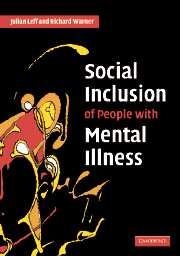1 - Introduction: barriers to social and occupational integration
Published online by Cambridge University Press: 24 October 2009
Summary
The focus in this book is on people with serious mental illnesses, particularly psychoses, schizophrenia and manic-depressive illness (termed bipolar illness in the USA). Although less serious psychiatric conditions such as depression may also lead to social and occupational exclusion, the barriers are not as formidable or as extensive as with the psychotic illnesses. Perhaps this is because the latter often produce symptoms with which the person in the street cannot empathise. One of us (JL) was sharing the platform at a public meeting with Lewis Wolpert, who has written and spoken extensively about the severe depressive illness he suffered in the past and from which he has fully recovered. He told the audience that it took a great effort for him to overcome his reluctance to expose his experience to the public because of the considerable stigma accorded to depression. JL followed this confession by relating that when patients in his care who suffer from schizophrenia ask him how to explain the gaps in their work record to a potential employer, he advises them to say that they have been depressed.
Disabilities produced by the illness
The barriers are partly attributable to the effects of the illness and its management by professionals and partly to the reaction of the public. Both schizophrenia and manic-depressive illness commonly lead to delusions – false beliefs about the world – and hallucinations – seeing or hearing things that others do not experience.
- Type
- Chapter
- Information
- Social Inclusion of People with Mental Illness , pp. 1 - 6Publisher: Cambridge University PressPrint publication year: 2006



